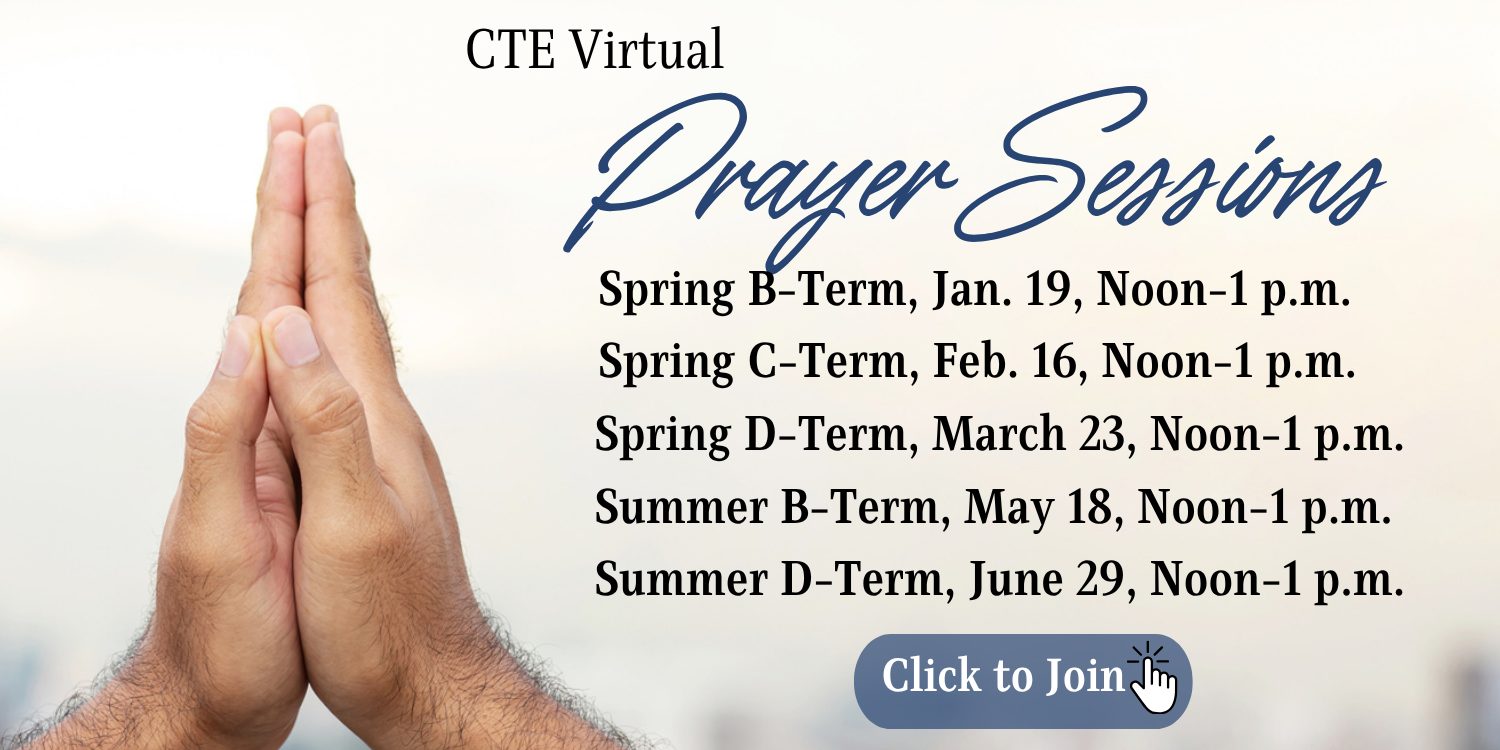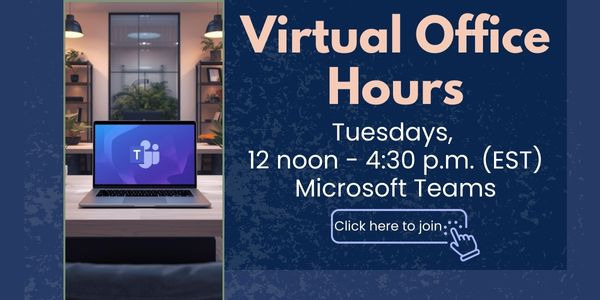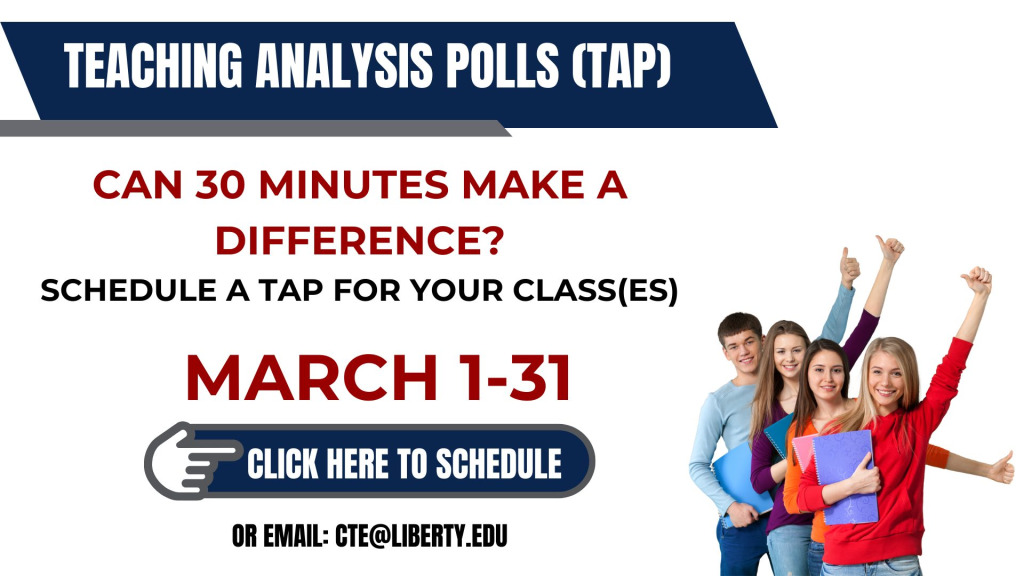Newsletter

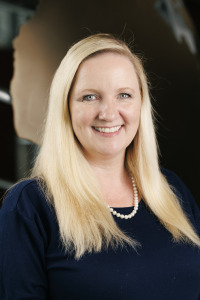
Director’s Welcome
Dr. Alexandra Barnett, Director of Teaching Excellence
Dear Faculty,
As we begin the spring semester, I am again reminded of Galatians 5:22-23 and the beautiful Fruit of the Spirit. In our work as educators, we have daily opportunities to demonstrate love, joy, peace, patience, kindness, goodness, faithfulness, gentleness, and self-control. These qualities not only shape our classrooms but also cultivate flourishing communities where students feel engaged and inspired to learn.
As Christian educators, we can continue to be intentional this semester about reflecting these traits in tangible ways: through how we listen, how we encourage, and how we respond under pressure. Small acts of grace and patience can have a lasting influence on students and colleagues alike. In a world often marked by hurry, we have the privilege of showing what it looks like to teach and lead with the Fruit of the Spirit at the center.
At the Center for Teaching Excellence, we remain committed to supporting you as Christ-centered educators through workshops, consultations, and resources. May this spring bring continued spiritual fruit in all you do for your students, your colleagues and leadership, and the Kingdom.
With appreciation,
Dr. Alexandra Barnett

2026 Conference on Teaching Excellence: The Fruit of the Spirit
On Wednesday, Jan. 14, 2026, Liberty University faculty will gather for the 2026 Conference on Teaching Excellence. Guided by Liberty’s commitment to Faith and Flourishing, this year’s conference theme, “The Fruit of the Spirit,” invites Liberty residential and online faculty to participate in workshops, discussions, and shared reflection on teaching and learning during this half-day event.
The conference will feature more than 100 workshops, roundtables, videos, prayer sessions, academic papers, and research posters. Faculty will be enrolled in the 2026 Conference on Teaching Excellence Canvas course by Tuesday, Jan. 13. A detailed program, including the schedule and workshop descriptions, will be available in the Conference Overview module. MS Teams links to live workshops will be provided within each session. Breakout sessions will be recorded and posted following the event. In addition to the synchronous events, the conference will include pre-recorded workshops, poster sessions, and academic papers. Faculty will retain access to the Canvas course throughout the Spring 2026 semester.
Conference Schedule
- Conference Overview: 8-8:15 a.m. EST
- Virtual Breakout Session I: 8:15-8:45 a.m. EST
- Virtual Breakout Session II: 8:50-9:20 a.m. EST
- Virtual Breakout Session III: 9:25-9:55 a.m. EST
- Break: 9:55-10:10 a.m. EST
- Virtual Breakout Session IV: 10:10-10:40 a.m. EST
- Virtual Breakout Session V: 10:45-11:15 a.m. EST
- Virtual Breakout Session VI: 11:20-11:50 a.m. EST
- Virtual Breakout Session VII: 11:55 a.m.-12:25 p.m. EST
- Pre-recorded Sessions, Posters, and Papers: On Demand in Canvas
The conference is open to all residential and online faculty, and participation is strongly encouraged. Faculty may earn CEUs by completing a verification quiz in the Canvas course. For more information, visit the Conference on Teaching Excellence website or contact CTE@liberty.edu.
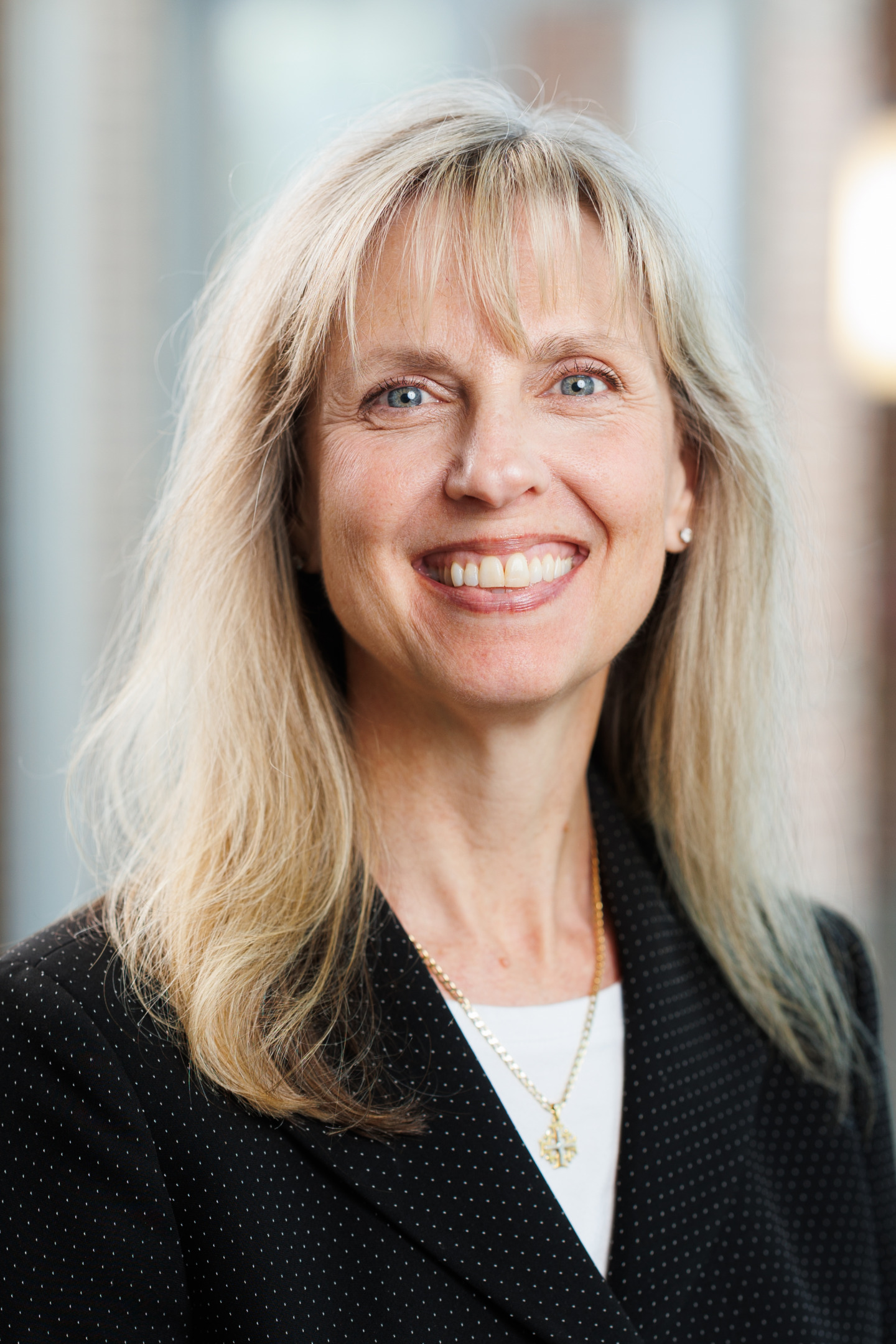
The Goal of Biblical Worldview Integration
Dr. Melissa Clemmons, Teaching Consultant
Learning and teaching are both labor and reward. Understanding one’s academic discipline is struggle and joy. Each person approaches the work and the celebration in his own way. Likewise, Christian professors struggle and rejoice as they examine their discipline through a biblical worldview. Christian professors do so because “everything is theological” (Wilson, 1989, p. 156). Everything includes physics, art, human nature, literary criticism, opinions, aviation, chemistry, academic definitions, accounting, counseling, engineering, medicine, marriage, theories, music– all of it.
In our pursuit of truth, Christian professors not only think deeply but wrestle with spiritual principalities (Ephesians 6:12) to take every thought captive to Christ (2 Corinthians 10:5) and to see and say what is real (Colossians 2:17). The telos of this wrestling for the Christian professor is beautifully illustrated in Moses’ song in Deuteronomy 32:2-3: “Let my teaching fall like rain and my words descend like dew, like showers on new grass, like abundant rain on tender plants. I will proclaim the name of the Lord. Oh, praise the greatness of our God!” (New International Bible, 2011). Like Moses, the goal of our teaching is natural growth.
As you wrestle in your reading and writing and planning and teaching, don’t grow weary in this great work! God will empower your faithfulness (Philippians 1:6,9-11). When you are at an impasse, hold up your cup and “call on the name of the LORD,” trust the Lord to show you the way, to offer wisdom and understanding to teach in a way that brings glory to God and truth to your students (New International Bible, 2011, Psalm 116:13). Remind yourself, your colleagues, and your students of the joy of learning. Celebrate the true and critique error one idea at a time as you gather rich ideas for the banquet of learning. Trust God in the mystery and the things you are yet to understand and do the next right thing. First Peter 3:6b says it this way, “do good, and do not fear anything that is frightening.” God has given Liberty University a good purpose. Ours is to work and celebrate faithfully. He will bring the harvest.
References
New International Bible. (2011). The NIV Bible. https://www.thenivbible.com/ (Original work published 1978).
Wilson, M. R. (1989). Our father Abraham: Jewish roots of the Christian faith. William B. Eerdmans Publishing Company.
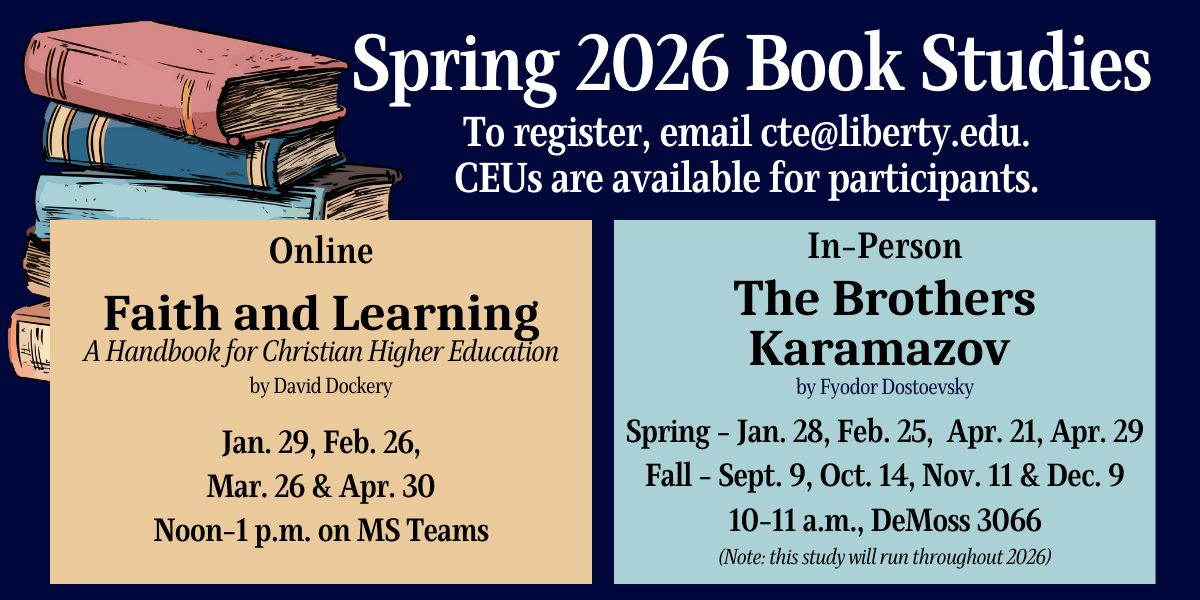

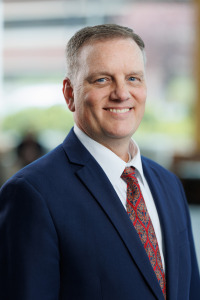
Practical Strategies to Foster Student Flourishing
Kjell Fenn, Teaching Consultant
In university classrooms today, cultivating student flourishing encompasses far more than academic performance. Flourishing means nurturing students’ sense of purpose, belonging, resilience, and character, which is effectively done through our call to Train Champions for Christ. Every student is made in the image of God (Genesis 1:27), endowed with dignity, giftedness, and potential. Every student at Liberty has chosen to attend our university. Students generally have a desire to succeed in their classes. It is incumbent on us to provide them with the best experience possible (Colossians 3:23). To do this, we can employ the following strategies:
- Let students know they are seen, known, and valued
- Help students see meaning in their learning
- Assist students in building resilience
- Build relational connections with students
Students thrive and persist when they feel seen, known, and valued (Darling-Hammond et al., 2019; Tinto, 2012). Take the time to learn students’ names and greet them warmly to create a welcoming atmosphere where students feel seen and known. Ask about their lives and listen attentively to positively affect students’ sense of belonging. By recognizing students’ work, praising their effort, and commending them on a job well done, a culture of personal value is created. In correcting their mistakes, show patience, humility, and grace.
When students see their learning as meaningful to something beyond themselves, it provides learners with a sense of agency and hope (Olson, 2025). Design assignments that invite students to reflect on their personal aspirations or how their work might contribute to society, career, or God’s redemptive work in the world (Olson, 2025). To do this, make clear connections between your course and its assignments, as well as the course and the program. Illustrate the broader purpose of the course content in students’ daily lives and their future careers and have students reflect on the course outcomes making personal and professional connections.
Teachers can help build resilience in students. Resilience is the ability to cope with stress and challenges effectively (Yaron Weston, 2022). Faculty can do this by normalizing struggles and failure as part of growth by using grace‐filled practices like offering revision opportunities or structuring feedback in ways that affirm growth over mere correctness. Remind students of their purpose, that they do have a calling in God (Ephesians 2:10). Using collaborative learning strategies such as turn-to-your-neighbor, think-pair-share, and small groups, also aid in building resilience.
Relational connections between students and teachers are a stabilizing force (Olson, 2025; Tinto, 2012). When faculty cultivate genuine relationships through mentorship, office hours, and informal conversation, they embody Christ‐like love. Scripture models this relational engagement, as when Jesus stops to engage personally with people often ignored by others (John 4:7–26; Luke 19:1–10). A spirit of compassion, hospitality, and listening will help students recover from failures, manage stress, and grow in character (Darling-Hammond et al., 2019; Olson, 2025).
At Liberty University, fostering student flourishing goes beyond just academic success; it also involves embracing purpose, belonging, resilience, and character. Faculty embody Christ-like love by ensuring students feel seen, known, and valued by connecting learning to broader purposes, building resilience through grace-filled practices, and cultivating relational connections. These strategies, grounded in Scripture and research, empower students to thrive intellectually, emotionally, socially, and spiritually, ultimately fulfilling our mission to Train Champions for Christ.
References
Darling-Hammond, L., Flook, L., Cook-Harvey, C., Barron, B., & Osher, D. (2019). Implications for educational practice of the science of learning and development. Applied Developmental Science, 24(2), 97–140. https://doi.org/10.1080/10888691.2018.1537791
Olson, R. S. (2025). On the promotion of human flourishing in education: Formative concepts. British Journal of Educational Studies, 1–21. https://doi.org/10.1080/00071005.2025.2542680
Tinto, V. (2012). Enhancing student success: Taking the classroom success seriously. The International Journal of the First Year in Higher Education, 3(1). https://doi.org/10.5204/intjfyhe.v3i1.119
Yaron Weston, L. (2022). Teaching resilience and mental health across the curriculum: A guide for high school and college teachers. Routledge. https://doi.org/10.4324/9781003318408
Focus on Faculty: Dr. Sherri Walker
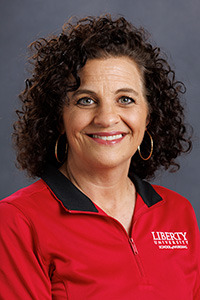
PMHNP/DNP Program Director | Associate Professor of Nursing
School of Nursing
Years of Service: 6 years
Favorite Scripture: Psalm 46:10
Dr. Sherri Walker serves as the Program Director for the Psychiatric Mental Health Nurse Practitioner and Doctor of Nursing Practice programs at Liberty University, where she is also an Associate Professor of Nursing. Since joining the university in 2019, Dr. Walker has held a variety of roles, including online adjunct faculty, practicum field director, Instructional Mentor, and Subject Matter Expert, each reflecting her unwavering commitment to student-centered education, academic excellence, and holistic care. In recognition of her outstanding contributions, Dr. Walker was honored as a 2024–25 President’s Award for Excellence in Teaching recipient and selected as a 2025–26 CTE Faculty Fellow.
Dr. Walker’s teaching philosophy is deeply aligned with Liberty University’s mission of Training Champions for Christ. Her integration of faith, psychology, and whole-person wellness creates a learning environment that is both rigorous and spiritually nurturing. She brings decades of clinical experience to her graduate-level courses, including Neurobiology and Differential Diagnosis of Mental Disorders, Psychotherapeutic Theories and Modalities, and multiple psychiatric nurse practitioner practicums.
Dr. Walker’s students consistently praise her ability to make complex concepts accessible, engaging, and relevant to real-world practice. One student, now serving as an Active-Duty officer in the United States Air Force, credits Dr. Walker’s instruction in NURS 755 and NURS 821 as “instrumental in my development as a competent and compassionate mental health provider.” They emphasized her “genuine passion for the subject matter” and her “unwavering dedication to student success,” noting that she provided personal contact information to ensure accessibility and support beyond scheduled class times.
Another student reflected on Dr. Walker’s mentorship during clinical courses, describing her as “the epitome of well-rounded excellence.” This student also shared how Dr. Walker’s guidance and encouragement helped them overcome challenges that might have otherwise derailed their pursuit of the Psychiatric-Mental Health Nurse Practitioner degree. Dr. Walker fosters a strong sense of community among her students, encouraging collaboration, open dialogue, and mutual support. Her mentorship is marked by emotional intelligence, practical insight, and a deep commitment to each student’s personal and professional growth. Whether guiding a scholarly project or offering a word of prayer, Dr. Walker consistently reflects Christ’s compassion and wisdom.
Anchored in her favorite verse, Psalm 46:10, “Be still, and know that I am God; I will be exalted among the nations, I will be exalted in the earth” (NIV), Dr. Walker cultivates a calm and faith-filled environment where students are invited to pause, reflect, and grow. Her commitment to holistic, biopsychosociospiritual care flows from a deep trust in God’s sovereignty, evident not only in her scholarship and teaching but also in the quiet strength of her mentorship and servant leadership.
Through her scholarship, service, and spiritual integrity, Dr. Sherri Walker honors God and Liberty University, preparing future nurse practitioners to lead with compassion, clinical expertise, and Christ-centered purpose. Her students’ heartfelt endorsements speak volumes about her transformative impact and affirm her as a truly exceptional educator.
Video Resources
Implementing AI in the Classroom
Serving Students with MS Teams
Artificial intelligence is reshaping education, and Liberty University is leading the way! Discover how faculty can harness the power of Copilot—the approved AI tool for classroom use—to create engaging, ethical, and effective learning experiences. From crafting smart prompts to modeling best practices, this video from Jake Byrd, Faculty Trainer, will show you how to turn AI into a trusted ally for research, study, and student success.
Running time: 4:23
You may already use Microsoft Teams for virtual meetings, but did you know that there are features that can make your meetings smoother and more accessible? This video by Justin Bamba, Educational Technologist, highlights three such features: file attachments, live captions, and the meeting lobby.
Running time: 3:10
Campus Services Spotlight: CARE and Support
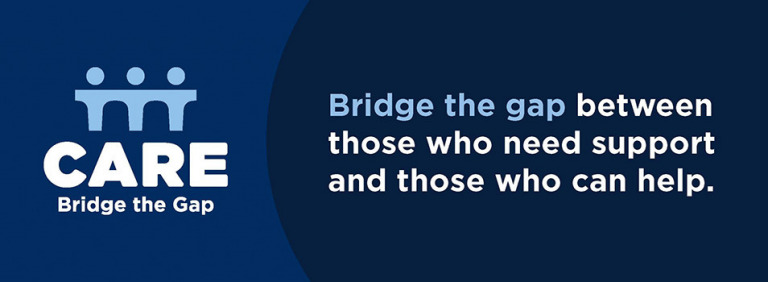
Mental health represents one of the main struggles that students face throughout their college career. According to the National Education Association, 44% of students polled reported experiencing depression, 37% reported suffering from anxiety, and 15% reported that they were considering suicide (Flannery, 2023). As faculty, it can be difficult to know how to interact with and respond to students going through these all-too-common crises. Providing love and safety for students in these situations can also be difficult when students are in danger of potential harm to themselves or others. That is where Liberty University’s CARE and Support office steps in.
CARE (Collaborate, Assess, Resource, Empower) and Support coordinates efforts between various offices, assesses and manages threats, acts as a resource hub, and empowers students to face their mental and emotional health struggles. Concerned faculty can reach out to experienced advisors to refer students experiencing any type of crisis, from depression and anxiety to threats against themselves or others. Once a referral has been made, the CARE and Support office will review the information and determine the best course of action to best address the concerns and support the students involved by connecting them to necessary resources and help.
Each year, this team receives thousands of referrals of varying types, each one requiring careful analysis and a gentle approach. CARE and Support provides each referred student with non-violent solutions, an opportunity to share their side of the story and proactively advocate for their well-being. These simple interventions in a student’s life can help them turn away from harm to themselves or others and point them towards a life of flourishing in Christ.
Faculty members can make a referral by going to the CARE and Support website and filling out a Beacon report. A link to the form can also be found under the faculty resources in Canvas. By including a factual and thorough account of behaviors and providing information in a timely manner, faculty can become active participants in the defense of their students. CARE and Support relies on faculty and staff to help show Christ’s love towards students.
For more information about CARE and Support, visit their website at www.liberty.edu/care. You can also contact them by email at CARE@liberty.edu, by phone at (434) 592-5638, or by visiting their office in Green Hall, Room 1838.
Reference
Flannery, M. E. (2023, March 29). The mental health crisis on college campuses. National Education Association. https://www.nea.org/nea-today/all-news-articles/mental-health-crisis-college-campuses
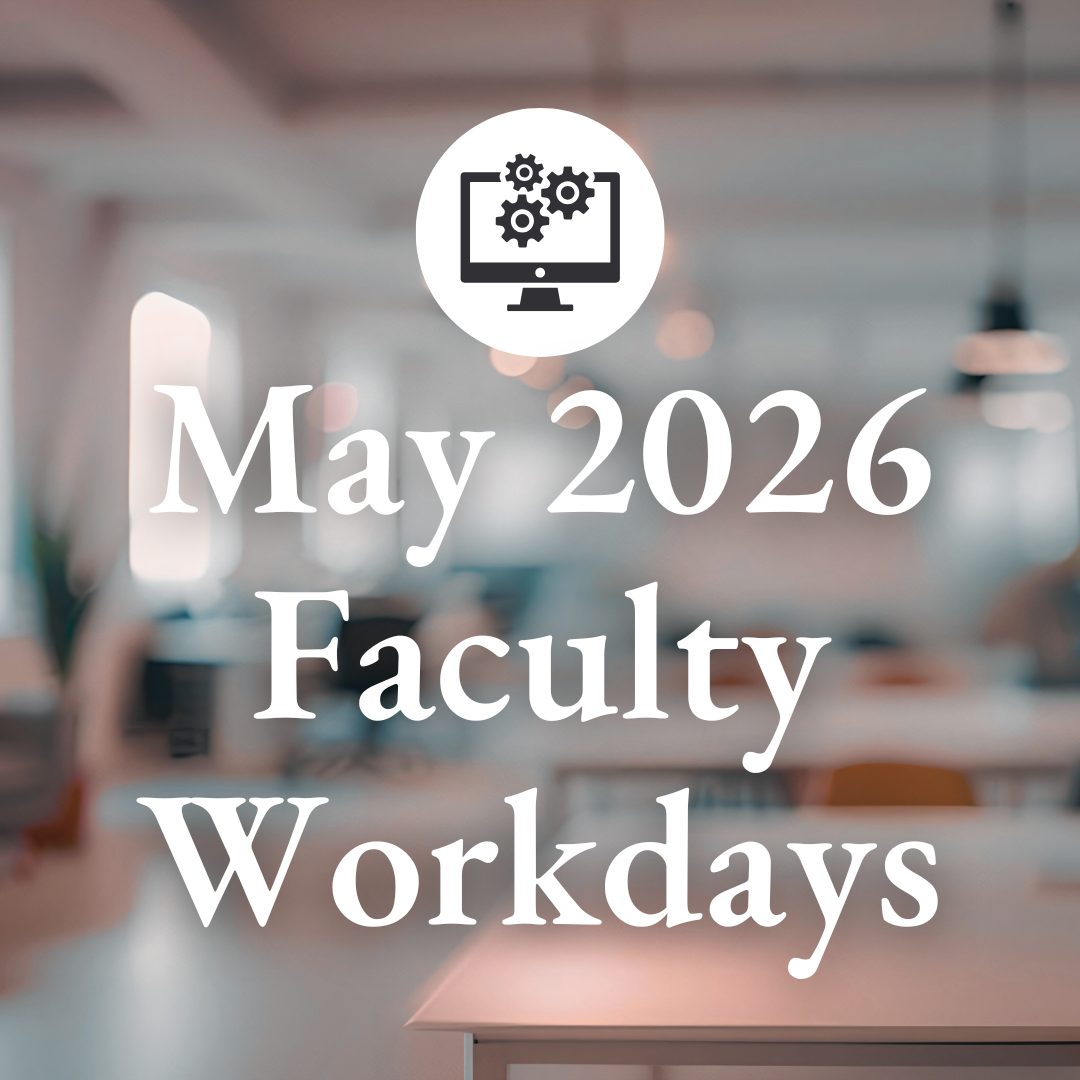
May 2026 Faculty Workdays
The Center for Teaching Excellence offers in-depth, in-person instruction that emphasizes hands-on application and evidence-based pedagogy during Faculty Workdays. Participants will engage in dynamic active learning experiences designed to support the development of actionable plans for implementing effective teaching strategies and technology. By the conclusion of each event, faculty will leave with a strong foundation in research-informed theory as well as practical technology tools to enhance student engagement and learning in their classrooms.
May 2026 Faculty Workdays:
- Helping Students Identify and Develop Their Strengths, Sarah Boettger; Monday, May 18, 9-11:30 a.m.
- Student Motivation: Engaging Students in Residential Classes, Kjell Fenn; Tuesday, May 19, 9-11:30 a.m.
- Taking Teaching to New Heights with AI, Jake Byrd; Tuesday, May 19, 1-3:30 p.m.
- Teaching With Technology Residential Boot Camp; Thursday-Friday, May 21-22, 8:30 a.m.-4 p.m.
- Teaching With Technology Virtual Boot Camp; Saturday, May 23, 8:30 a.m.-4 p.m.
Register via the Course Registration Tool in myLU (Subject Code: PDCT). Contact cte@liberty.edu for any questions. CEUs will be available to attendees.
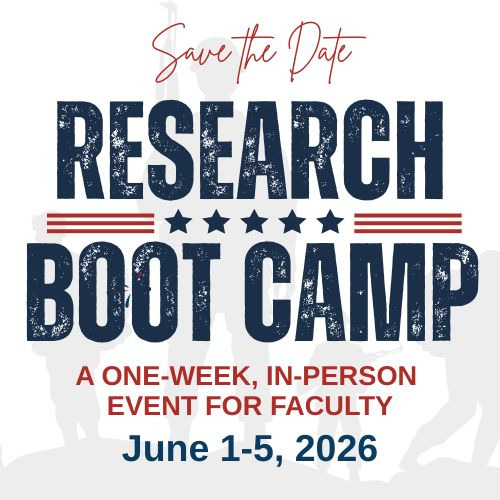
Research Boot Camp (Monday-Friday, June 1-5, 8:30 a.m.-4:30 p.m.)
CTE is excited to announce the 2026 Research Boot Camp, June 1-5. Designed exclusively for higher education faculty, this multiday camp allows participants to be part of a team that conducts academic research and completes an entire journal article and academic poster in one week.
Over the course of boot camp, you will:
- Attend sessions on creating a journal article, submission strategies, and navigating the publication process
- Conduct original academic research with live participants
- Receive expert guidance on methodology, data collection, analysis, and reporting
- Prepare a scholarly article for submission to Liberty University’s Journal for the Scholarship of Teaching and Learning
- Create an academic poster to showcase your project at an upcoming conference
By the conclusion of the week, faculty will leave Research Boot Camp with an article accepted for publication in a scholarly journal, approval to present at a conference, a template for an academic poster, and skills for scholarly success. Additionally, participants will be provided meals and a stipend for attending all five days of camp. Continuing Education Units (CEUs) will be available upon request. Register by emailing cte@liberty.edu or via the Course Registration tool in myLU (Subject Code: PDCT).

Don’t miss out on CTE’s Spring professional development opportunities. In our calendar, you will find a full range of topics, such as teaching and learning, biblical worldview integration, and teaching with technology. Please register via the Course Registration tool in myLU (Subject Code: PDCT). For workshops that are held via MS Teams, links will be sent to registered participants in advance. Email cte@liberty.edu with questions.
January
- CTE Open Virtual Office Hours; Tuesday, Jan. 20 & 27
Noon-4:30 p.m. No registration required. Log on: MS Teams - New Faculty Orientation; Monday, Jan. 13
8 a.m.-4:30 p.m.; DeMoss Hall, Room 3066 - Teaching Students with Disabilities: Teaching Academy; Thursday, Jan. 15
9-11:30 a.m.; DeMoss Hall, Room 3066 and MS Teams
Dr. Ester Warren, Facilitator. CEUs available upon request. - Teaching Students to Think Critically: Teaching Academy; Thursday, Jan. 15
1-3:30 p.m.; DeMoss Hall, Room 3066 and MS Teams
Dr. Dan Berkenkemper, Facilitator. CEUs available upon request. - Canvas for Teachers; Friday, Jan. 16
9-11:30 a.m.; DeMoss Hall, Room 3066 and MS Teams - Canvas for Designers; Friday, Jan. 16
1-3:30 p.m.; DeMoss Hall, Room 3066 and MS Teams - Virtual Prayer Session: Spring B-Term; Monday, Jan. 19
Noon-1 p.m. No registration required. Log on: MS Teams - Improving Student Satisfaction: Strengthening Student Connections Series; Wednesday, Jan. 21
5-5:45 p.m.; MS Teams - Engaging Your Residential Class with Top Hat; Friday, Jan. 23
10:30-11:15 a.m.; DeMoss Hall, Room 3066 and MS Teams - Creating Assignments, Quizzes, and Rubrics in Canvas; Monday, Jan. 26
10:30-11:15 a.m.; DeMoss Hall, Room 3066 and MS Teams - Navigating Technical Challenges: Strengthening Student Connections Series; Wednesday, Jan. 28
5-5:45 p.m.; MS Teams - Academic Integrity and AI: A Skills-Based Workshop for AI Discovery; Friday, Jan. 30
10:30-11:15 a.m.; DeMoss Hall, Room 3066 and MS Teams
Offered in collaboration with the Office of Academic Integrity
February
- CTE Virtual Open Office Hours; Tuesday, Feb. 3, 10, 17 & 24
Noon-4:30 p.m. No registration required. Log on: MS Teams - Boosting Learner Motivation: Strengthening Student Connections Series; Wednesday, Feb. 4
5-5:45 p.m.; MS Teams - Biblical Worldview Integration: Spring Keynote with Dr. Mark Eckel; Thursday, Feb. 5
11:30 a.m.-12:30 p.m.; DeMoss Hall, Room 3066 and MS Teams - Gamification in the College Classroom; Friday, Feb. 6
10:30-11:15 a.m.; DeMoss Hall, Room 3066 and MS Teams - Engaging Your Classes with MS Whiteboard; Monday, Feb. 9
10:30-11:15 a.m.; DeMoss Hall, Room 3066 and MS Teams - Reviving Student Engagement: Strengthening Student Connections Series; Wednesday, Feb. 11
5-5:45 p.m.; MS Teams - Beyond Attendance: Top Hat for Active Learning; Friday, Feb. 13
10:30-11:15 a.m.; DeMoss Hall, Room 3066 and MS Teams - Designing Outstanding Residential Courses: An Overview; Monday, Feb. 16
10:30-11:15 a.m.; DeMoss Hall, Room 3066 and MS Teams - Virtual Prayer Session: Spring C-Term; Monday, Feb. 16
Noon-1 p.m. No registration required. Log on: MS Teams - Utilizing Video Messages to Enhance Teacher Presence: Canvas Tools for Effective Teaching Series; Wednesday, Feb. 18
Noon-12:45 p.m.; MS Teams - Fostering Student Engagement with Adobe Express QR Codes; Friday, Feb. 20
10:30-11:15 a.m.; DeMoss Hall, Room 3066 and MS Teams - Logos Tools for Faculty; Monday, Feb. 23
10:30-11:15 a.m.; DeMoss Hall, Room 3066 and MS Teams - Engaging Students with Message Students Who: Canvas Tools for Effective Teaching Series; Wednesday, Feb. 25
Noon-12:45 p.m.; MS Teams - Creating Videos with Adobe Express; Friday, Feb. 27
10:30-11:15 a.m.; DeMoss Hall, Room 3066 and MS Teams
March
- CTE Virtual Open Office Hours; Tuesday, Mar. 3, 10, 17, 24 & 31
Noon-4:30 p.m. No registration required. Log on: MS Teams - Strategies for Communication: Canvas Tools for Effective Teaching Series; Wednesday, Mar. 4
Noon-12:45 p.m.; MS Teams - Biblical Worldview Integration with Dr. David Wheeler; Thursday, Mar. 5
11:30 a.m.-12:30 p.m.; DeMoss Hall, Room 3066 and MS Teams - Advanced Methods for the Active Learning Classroom; Friday, Mar. 6
10:30-11:15 a.m.; DeMoss Hall, Room 3066 and MS Teams - Improving Accessibility for Students: Canvas Tools for Effective Teaching Series; Wednesday, Mar. 11
Noon-12:45 p.m.; MS Teams - Using AI to Enhance Teaching and Learning; Friday, Mar. 13
10:30-11:15 a.m.; DeMoss Hall, Room 3066 and MS Teams - Virtual Prayer Session: Spring D-Term; Monday, Mar. 23
Noon-1 p.m. No registration required. Log on: MS Teams - Examining a Discipline’s Assumptions: Biblical Worldview in Online Education; Wednesday, Mar. 25
5-5:45 p.m.; MS Teams - Teaching Students to Use AI Ethically; Friday, Mar. 27
10:30-11:15 a.m.; DeMoss Hall, Room 3066 and MS Teams
April
- CTE Virtual Open Office Hours; Tuesday, Apr. 7,14, 21 & 28
Noon-4:30 p.m. No registration required. Log on: MS Teams - Finding Coherence in the Disciplines: Biblical Worldview in Online Education Series; Wednesday, Apr. 1
5-5:45 p.m.; MS Teams - Biblical Worldview Integration with Dr. Kenyon Knapp; Thursday, Apr. 2
11:30 a.m.-12:30 p.m.; DeMoss Hall, Room 3066 and MS Teams - Using AI to Enhance Teaching and Learning; Friday, Apr. 3
10:30-11:15 a.m.; DeMoss Hall, Room 3066 and MS Teams - Seeing and Serving Students: Biblical Worldview in Online Education Series; Wednesday, Apr. 8
5-5:45 p.m.; MS Teams - Preparing Your RESDEV for Course Copy; Friday, Apr. 10
10:30-11:15 a.m.; DeMoss Hall, Room 3066 and MS Teams - Course Analysis: The Dive into Rigor, Videos, and So Much More; Monday, Apr. 13
10:30-11:15 a.m.; DeMoss Hall, Room 3066 and MS Teams
Hosted in collaboration with the Center for Academic Development - Approaching Research and Interdisciplinarity: Biblical Worldview in Online Education Series; Wednesday, Apr. 15
5-5:45 p.m.; MS Teams - Creating Assignments and Activities with Logos; Friday, Apr. 17
10:30-11:15 a.m.; DeMoss Hall, Room 3066 and MS Teams - AI Tools for Assignments and Activities; Monday, Apr. 20
10:30-11:15 a.m.; DeMoss Hall, Room 3066 and MS Teams - Connecting to Our Mission and Purpose as Faculty: Maintaining the Standards of Instruction Series; Wednesday, Apr. 22
Noon-12:45 p.m.; MS Teams - Visual Design Principles for PowerPoint; Monday, Apr. 27
10:30-11:15 a.m.; DeMoss Hall, Room 3066 and MS Teams - Fostering an Inclusive & Accessible Community for Our Students: Maintaining the Standards of Instruction Series; Wednesday, Apr. 29
- Noon-12:45 p.m.; MS Teams
May
- CTE Virtual Open Office Hours; Tuesday, May 5, 12, 19, 26
Noon-4:30 p.m. No registration required. Log on: MS Teams - Establishing Fair and Transparent Grading Practices: Maintaining the Standards of Instruction Series; Wednesday, May 6
Noon-12:45 p.m.; MS Teams - Wrapping Up Your Semester Well; Friday, May 8
10:30-11:15 a.m.; DeMoss Hall, Room 3066 and MS Teams - Refreshing the Soul as You Anticipate the Summer; Monday, May 11
10:30-11:15 a.m.; DeMoss Hall, Room 3066 and MS Teams - Nurturing Continuous Academic and Professional Growth: Maintaining the Standards of Instruction Series; Wednesday, May 13
Noon-12:45 p.m.; MS Teams - Virtual Prayer Session: Summer B-Term; Monday, May 18
Noon-1 p.m. No registration required. Log on: MS Teams - Teaching With Technology Residential Boot Camp; Thursday-Friday, May 21-22
8:30 a.m.-4 p.m.; DeMoss Hall, Room 3066 - Teaching With Technology Online Boot Camp; Saturday, May 23
8:30 a.m.-4 p.m.; MS Teams - Reclaiming Your Time: Teaching Well Online Series; Wednesday, May 27
5-5:45 p.m.; MS Teams
June & July
- CTE Virtual Open Office Hours; Tuesday, Jun. 2, 9, 16, 23 & 30; Jul. 7, 14, 21 & 28
Noon-4:30 p.m. No registration required. Log on: MS Teams - Research Boot Camp; Monday-Friday, Jun. 1-5
8:30 a.m.-4:30 p.m.; DeMoss Hall, Room 3066 - Avoiding Burnout: Teaching Well Online Series; Wednesday, Jun. 10
5-5:45 p.m.; MS Teams - Balancing Work and Rest: Teaching Well Online Series; Wednesday, Jun. 17
5-5:45 p.m.; MS Teams - Spiritual Disciplines: Teaching Well Online Series; Wednesday, Jun. 24
5-5:45 p.m.; MS Teams - Virtual Prayer Session: Summer D-Term; Monday, Jun. 29
Noon-1 p.m. No registration required. Log on: MS Teams - Community and Connections for Online Faculty: Teaching Well Online Series; Wednesday, Jul. 1
5-5:45 p.m.; MS Teams - Supporting Student Well-Being and Spiritual Formation in a Remote Setting: Grace-Filled Growth in Higher Education; Wednesday, Jul. 8
Noon-12:45 p.m.; MS Teams - Navigating Academic Integrity and Plagiarism: Grace-Filled Growth in Higher Education; Wednesday, Jul. 15
Noon-12:45 p.m.; MS Teams - Using Student Feedback and Self-Assessment to Grow as a Christian Educator: Grace-Filled Growth in Higher Education; Wednesday, Jul. 22
Noon-12:45 p.m.; MS Teams - Curating Digital Resources that Align with Christian Values: Grace-Filled Growth in Higher Education; Wednesday, Jul. 29
Noon-12:45 p.m.; MS Teams
